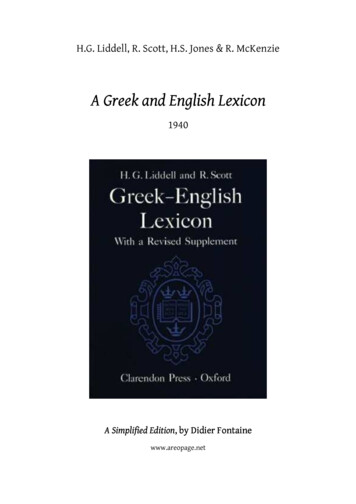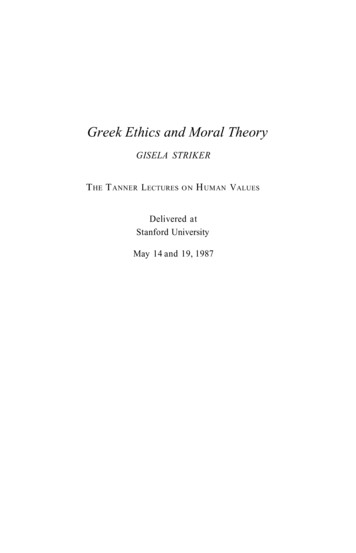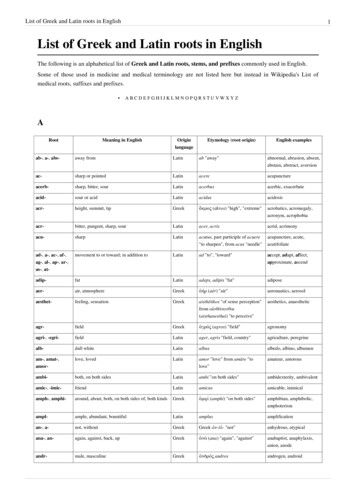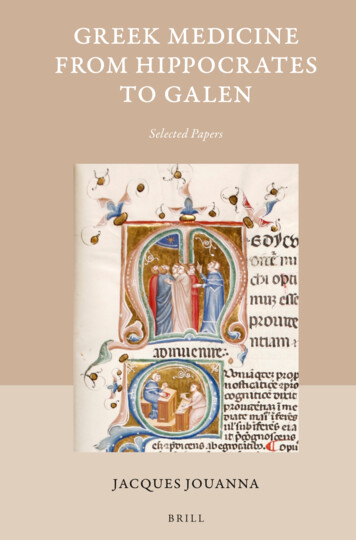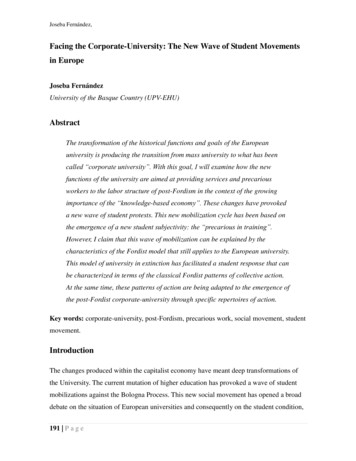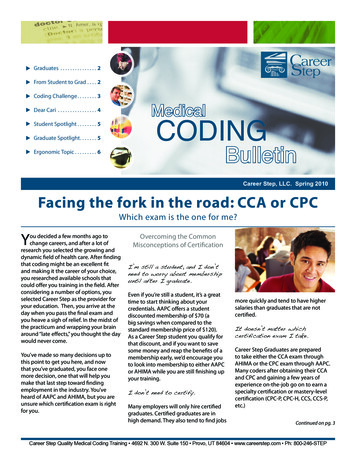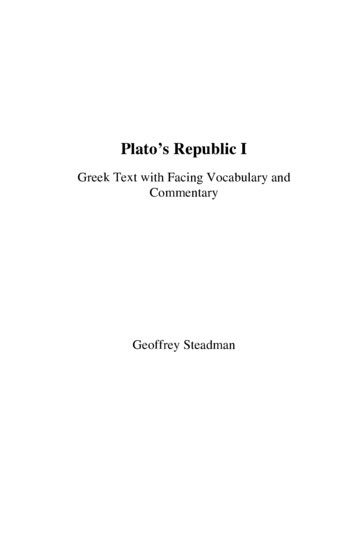
Transcription
Plato’s Republic IGreek Text with Facing Vocabulary andCommentaryGeoffrey Steadman
Plato’s Republic IGreek Text with Facing Vocabulary and CommentaryFirst Edition 2011 by Geoffrey D. SteadmanRevised June 2011, February 2012, July 2012All rights reserved. Subject to the exception immediately following, this book maynot be reproduced, in whole or in part, in any form (beyond that copying permitted bySections 107 and 108 of the U.S. Copyright Law and except by reviewers for thepublic press), without written permission from the publisher.The author has made an online version of this work available (via email) under aCreative Commons Attribution-Noncommercial-Share Alike 3.0 License. The termsof the license can be accessed at creativecommons.org.Accordingly, you are free to copy, alter, and distribute this work freely under thefollowing conditions:(1) You must attribute the work to the author (but not in any way that suggests thatthe author endorses your alterations to the work).(2) You may not use this work for commercial purposes.(3) If you alter, transform, or build upon this work, you may distribute the resultingwork only under the same or similar license as this one.The Greek text is the edition by John Burnet, first published by Oxford UniversityPress in 1903.ISBN-13: 978-0-9843065-4-1ISBN-10: 0-9843065-4-4Published by Geoffrey SteadmanCover Design: David SteadmanFonts: Times New Roman, SPIonic, GFS Porsongeoffreysteadman@gmail.com
Table of ContentsPagesPreface to the Series .v-viThe Dramatic Introduction to the Republic Book I vii-ixCharacters .xOutline of the Republic. xiBibliography . xiiHow to Use This Commentary . xiiiRunning Core Vocabulary List xiv-xixAbbreviations . xxRegular Verb Synopsis . . 90-91Synopses -mi Verb . . 92-93Alphabetized Core Vocabulary List . 94-99Republic Book 1The Descent into the Piraeus (327a-328c) .2-5Cephalus and Socrates (328c-331d) 5-15Justice is telling the truth and paying what one owesPolemarchus and Socrates (331d-336a) .15-33Justice is helping friends and harming enemiesThrasymachus and Socrates (336a-354c) . 33-89Justice is the advantage of the stronger
vPreface to the SeriesThe aim of this commentary is to make Plato’s Republic Book I as accessible aspossible to intermediate level Greek readers so that they may experience the joy,insight, and lasting influence that comes from reading one of greatest works inclassical antiquity in the original Greek.Facing each of the 44 pages of the Greek text (Burnet’s Oxford Classical Text) isa single page of commentary divided into halves. The top half includes all of thecorresponding vocabulary that occur five or fewer times in the dialogue, arrangedalphabetically in two columns. The bottom half is devoted to grammatical notes,which are organized according to the Stephanus page numbers (see Abbreviations)and likewise arranged in two columns. The advantage of this format is that it allowsme to include as much information as possible on a single page and at the same timeinsure that the numerous commentary entries are distinct and accessible to readers.To complement the vocabulary within the commentary, I have added a RunningCore Vocabulary List at the beginning of this commentary that includes all wordsoccurring six or more times arranged in the order in which they first occur in thedialogue. An alphabetized form of this list can be found in the glossary. Together, thisbook has been designed in such a way that, once readers have reviewed and masteredthe Running Core List, they will be able to rely solely on the Greek text and facingcommentary and not need to turn a page or consult outside dictionaries as they read.The grammatical notes are designed to help beginning readers read the text, andso I have passed over detailed literary and philosophical explanations in favor ofshort, concise, and frequent entries that focus exclusively on grammar andmorphology. The notes are intended to complement, not replace, an advanced levelcommentary, and so I encourage readers to consult some of the additional readingslisted in the bibliography. Assuming that readers finish elementary Greek withvarying levels of ability, I draw attention to subjunctive and optative constructions,identify unusual aorist and perfect forms, and in general explain aspects of the Greekthat they should have encountered in first year study but perhaps forgotten. As a rule,I prefer to offer too much assistance rather than too little.
viPrint on Demand BooksThis volume is a self-published, print-on-demand (POD) book, and as such itgives its author distinct freedoms and limitations that are not found in traditionalpublications. After writing this commentary, I simply purchased an ISBN number (theowner is de facto the publisher) and submitted a digital copy for printing. The mostsignificant limitation of a POD book is that it has not undergone extensive peerreview or general editing. This is a serious shortcoming that should make readerswary. Because there are so many vocabulary and commentary entries, there are sureto be typographical and factual errors that an extra pair of eyes would have spottedimmediately. Until all of the mistakes have been identified and corrected, I hope thereader will excuse the occasional error.The benefits of POD, however, outweigh the costs. This commentary and othersin the series simply would not exist without POD. Since there is no traditionalpublisher acting as a middle man, there is no one to deny publication of this workbecause it may not be profitable for the publisher. In addition, since the productioncosts are so low and there is no standing inventory of unsold books, I am able to offerthis book at a low price. Finally, since this book is no more than a .pdf file waiting tobe printed, I am able to make corrections and place a revised edition of a POD bookfor sale as often as I want. In this regard, we should liken PODs to software instead oftraditional typeset books. Although the first edition of a POD may not be as polishedas a traditional book, I am able to respond very quickly to readers’ recommendationsand criticisms and create an emended and augmented POD that is far superior toprevious editions. Consider, therefore, what you hold in your hand as an inexpensivebeta version of the commentary. If you would like to recommend changes to thisvolume or download a free .pdf copy, please contact me at the addresses below.I am grateful to Todd Jones, Ryan Proctor, and Scott Schreiber for their astuteobservations, which have led to a number of revisions throughout this volume.Geoffrey Steadman n.com
viiThe Dramatic Opening to the Republic Book IThe Republic is not a dialogue. It is a recollection of a dialogue. It begins as Socratesrecalls an extraordinarily long conversation that he had had on just the previous day.This introduction would seem to defy credulity, if it were not for the fact that Socratesis speaking during a festival in honor of an unnamed goddess—revealed only at theend of Book I to be the Thracian Bendis. On occasions such as the Panathenaicfestival, it was common for rhapsodes to recite from memory the Iliad and Odysseyfor Athenian audiences. Socrates, it appears, begins the Republic as a rhapsode—onewith an account that promises to be just as memorable as the epics of his own age.One of the conventions of epic poetry is to place added significance on the firstword in the poem. In the Iliad, the word is appropriately mh nin, “wrath,” and in theOdyssey the word is a1ndra, “man.” In the Republic, it is kate/bhn, “I descended,” aword that resonates with readers familiar with the later books in the Republic. Manywill recall the first half of the Allegory of the Cave and its description of the soul’sascent from darkness to the light, but few give equal attention to the second half ofthe allegory, the descent of the enlightened man back into the cave (517a). His eyesunaccustomed to the dark, his steps are unsure, and to the prisoners his educationmakes him unsuitable for life among the shadows. He tries to persuade others to joinhim in the ascent, but they refuse to follow his example and instead wish to kill him.The descent is at once an acknowledgement of the seemingly impractical nature of theenlightened man (his eyes need time to adjust to the darkness) and of the challengethat awaits him when he attempts to persuade others to follow his lead.It is tempting to view Socrates’ description of his descent from Athens to the portcity of Piraeus in light of the Allegory of the Cave. First, there are the physicalsimilarities. During the second half of the 5th century, long walls enclosed the entirefive-mile road that stretched from Athens to the port, and the cities themselves werealso contained within walls. In addition, the Piraeus was regarded as a bastion fordemocratic politics. In 403 B.C., for example, it was in Piraeus where the revoltwhich overthrew the oligarchic Thirty Tyrants and reestablished democratic rule firsttook hold. And so, when Socrates says “I descended yesterday to Piraeus,” it is not
viiidifficult for readers familiar with the Republic to envision Socrates’ descent betweenthe long walls as the enlightened man’s return to the cave and the dwellers within.Another telling piece of evidence is Socrates’ initial conversation withPolemarchus, a wealthy supporter of the democracy and brother of the famousspeechwriter Lysias. After witnessing the opening procession in the festival, Socratesis about to return to Athens accompanied by Glaucon, Plato’s brother, when he isstopped by Polemarchus and his entourage and invited to stay in Piraeus atPolemarchus’ house. In a veiled threat, Polemarchus says “Do you see how many weare?.Either then become stronger than these or remain here.” When Socrates objectsthat one option still is left, namely that he and Glaucon persuade Polemarchus to letthem go home, Polemarchus says that they will not be able to persuade (pei/swmen)him if he does not listen (327c7-12). This oddly inappropriate exchange between hostand guest highlights the contrast between the descending philosopher who advocatesdialogue and persuasion and a denizen of the Piraeus, who makes decisions based onthe democratic calculus of mass opinion, strength in numbers, and its resulting force.Finally, the third and most pervasive point of correspondence between theallegory and Socrates’ descent is the lack of success Socrates has persuading others atPolemarchus’ house. Polite conversation quickly gives way to a discussion ofdikaiosu/nh, a word that denotes “right action” in general but for practical purposeswe shall call “justice.” For most of Book I, Socrates examines and eventuallydismisses popular concepts of justice presented by Cephalus, his son Polemarchus,and finally Thrasymachus. Although Socrates prevails over each man in argument, noone is persuaded. After Cephalus, the self-proclaimed lover of lo/goi (328d3-4),excuses himself from his conversation with Socrates to finish a sacrifice, he neverreturns. His son Polemarchus, who fares no better than his father in defending his ownview of justice, is replaced in the discussion by Thrasymachus and does not seem theleast contrite. Finally, Thrasymachus, initially so full of bluster and rage, is silencedby the end of Book I, but he too seems less to have changed his mind than to haveabandoned the conversation altogether. In fact, even Plato’s own brothers, Glauconand Adeimantus, who are present throughout Book I and will become Socrates’ maininterlocutors for the remainder of the Republic, are dissatisfied with the outcome. At
ixthe beginning of Book II Socrates continues his recollection and says:When I said this, I thought I had done with the discussion, but it turned outto have been only a prelude. Glaucon showed his characteristic courage onthis occasion too and refused to accept Thrasymachus’ abandonment of theargument. Socrates, he said, do you want to seem to have persuaded us that itis better in every way to be just than unjust, or do you want to truly convinceus of this? (357a1-b2, tr. Grube)Plato clearly wishes for his readers to see Book I as a failure in persuasion and theremainder of the Republic as Socrates’ endeavor to make amends. Socrates is like theenlightened man who, after failing to persuade the reluctant and abusive prisoners thatthe shadows are not what they seem to be, renews his efforts to turn them to the light.Socrates’ failure does not mean that the arguments on justice are unworthy ofcareful scrutiny. Modern commentaries and articles abound, and readers shouldconsider the bibliography as a starting point for investigation. What is often left out ofthese analyses is how the readers’ knowledge of the present and future lives of theinterlocutors undermine the interlocutors’ own arguments.1 Cephalus, who amassed afortune by making and selling (a0podi/dosqai) shields to Athenians argues that justiceis “to tell the truth and give back (a0podi/donai) what is owed.” But he is stymied bySocrates when asked whether it is just to give back arms owed to an intemperatemadman—a prescient question in light of his customers’ defeat at the hands of theSpartans. Likewise, Polemarchus, who defends the popular view that justice is“helping friends and harming enemies,” will later see this ideal applied to his ownlife. After the Spartans defeat the Athenians in 404 BC, the Spartan-backed ThirtyTyrants will arrest and execute without trial its own political enemies, includingPolemarchus. Lastly, Thrasymachus, who is identified by
Core Vocabulary List at the beginning of this commentary that includes all words occurring six or more times arranged in the order in which they first occur in the dialogue. An alphabetized form of this list can be found in the glossary. Together, this book has been designed in such a way that, once readers have reviewed and mastered the Running Core List, they will be able to rely solely on .
